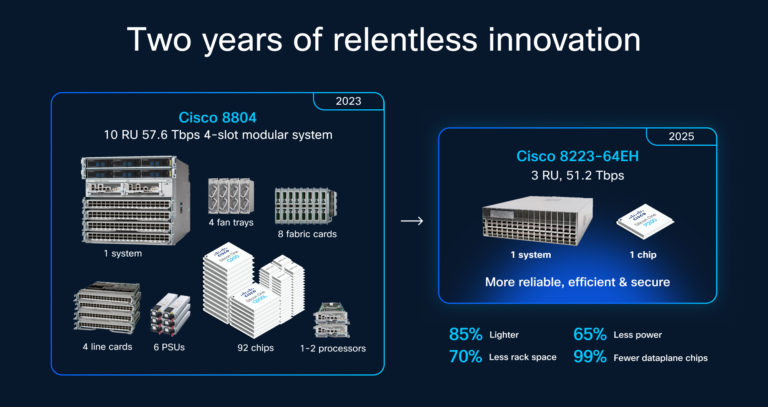Cisco's Silicon One P200 and 8223 Router: Transforming AI Data Centers
Cisco's Silicon One P200 chip and 8223 router redefine AI data center connectivity with unprecedented speed, efficiency, and security.

Cisco's Silicon One P200 and 8223 Router: Transforming AI Data Centers
Cisco Systems has launched a groundbreaking networking chip and router designed to meet the explosive growth and unique demands of artificial intelligence (AI) data centers. The new Silicon One P200 chip and Cisco 8223 router, announced in early October 2025, represent a significant leap in data center interconnect (DCI) technology by enabling massive bandwidth, enhanced scalability, and improved energy efficiency for AI workloads distributed across geographically dispersed data centers.
The Need for Advanced AI Data Center Networking
The rapid expansion of AI training clusters has pushed traditional data center networking to its limits. AI workloads require vast amounts of data to be transferred quickly and securely across multiple sites, often separated by hundreds or even thousands of miles. This distributed architecture is driven by the enormous power consumption of AI infrastructure, which compels companies to locate data centers in regions with cheaper and more abundant electricity, such as remote areas of Texas or Louisiana.
Traditional "scale-up" and "scale-out" networking approaches are no longer sufficient to handle the scale and power demands of modern AI systems. Cisco’s response is a "scale-across" strategy, which facilitates seamless and secure communication across multiple, distant data centers, optimizing resource allocation and enabling sustained growth for AI workloads.
Breakthrough Technology: Silicon One P200 Chip
At the core of Cisco’s new offering is the Silicon One P200, the industry's first 51.2 terabits per second (Tbps) full-duplex deep buffer router chip. This chip integrates the capabilities of what previously required 92 separate chips into a single highly compact and energy-efficient processor. It is specifically designed for AI data center networking with several standout features:
- Deep buffering technology: Allows the router to handle bursts of data traffic efficiently, preventing data loss during high-demand periods and enabling synchronization across distributed data centers.
- Low power consumption: Critical for reducing the operational costs and environmental impact of large-scale AI infrastructure.
- Security: The only device in its class to offer both data and system security, protecting sensitive AI workloads from cyber threats.
- Programmability: Equipped with run-to-completion engines that allow for future-proofing networks against new protocols and security enhancements.
Dave Maltz, Corporate Vice President for Azure Networking at Microsoft, praised the P200 for its innovation, stating that it offers faster networks with more buffering, which is essential for scaling AI/ML environments.
Cisco 8223 Router: Enabling Distributed AI Workloads
The Cisco 8223 router, powered by the Silicon One P200 chip, is a fixed Ethernet router capable of delivering 51.2 Tbps of bandwidth, making it the highest-capacity router in the industry. It is engineered to support distributed AI architectures by connecting multiple data centers over long distances with high reliability and security. This capability is critical as AI training jobs grow so large that they require resources pooled from data centers located up to 1,000 miles apart.
Martin Lund, Executive Vice President of Cisco’s Common Hardware Group, highlighted how the new router system addresses the need for connecting widely separated data centers while maintaining low latency, high throughput, and energy efficiency.
Competitive Position and Industry Impact
Cisco’s launch of the Silicon One P200 and the 8223 router marks a direct challenge to competitors like Broadcom, which introduced its own Ultra Ethernet Switch earlier in 2025. Cisco’s emphasis on deep buffering, power efficiency, and integrated security sets its solution apart in an increasingly competitive market focused on AI infrastructure.
The new technology is already garnering interest from major cloud providers and AI companies, with Microsoft and Alibaba evaluating Cisco’s latest networking gear to support their expanding AI workloads.
Broader Implications for AI and Data Center Infrastructure
The introduction of Cisco’s Silicon One P200 chip and 8223 router signals a pivotal shift in how AI data centers are designed and connected. By enabling a scale-across architecture, Cisco empowers organizations to:
- Optimize AI training and inference workloads by dynamically distributing tasks across multiple sites.
- Reduce the power and cooling constraints that have traditionally limited data center growth.
- Enhance network security and future-proof data center infrastructure against evolving threats and demands.
- Support the explosive data volumes and real-time processing needs of advanced AI models, including generative AI and large language models.
This advancement is crucial as AI continues to permeate industries, demanding faster, more flexible, and more sustainable data center networks.
Visuals to Complement the Story
- Cisco Silicon One P200 chip: Images of the chip highlighting its compact design and integration.
- Cisco 8223 router: Official product photos showing the hardware form factor.
- Martin Lund and Dave Maltz: Photos or official portraits of key executives discussing the technology.
- Network diagrams illustrating scale-across data center connectivity enabled by the new Cisco technology.
Cisco’s latest innovation is a milestone in networking technology, designed to meet the formidable challenges of AI data center connectivity with unmatched speed, efficiency, and security. As AI workloads grow in scale and complexity, Cisco’s Silicon One P200 and 8223 router are poised to become foundational technologies for the future of distributed AI infrastructure.
Image: Cisco’s Silicon One P200 chip, the industry’s first 51.2Tbps full-duplex deep buffer router processor.
Image: Cisco 8223 router powered by the Silicon One P200 chip, designed for high-capacity AI data center connectivity.




